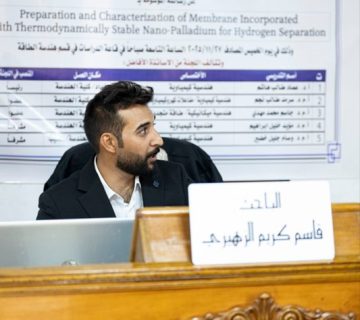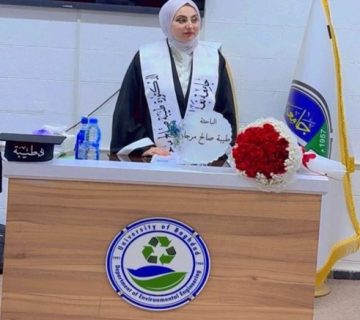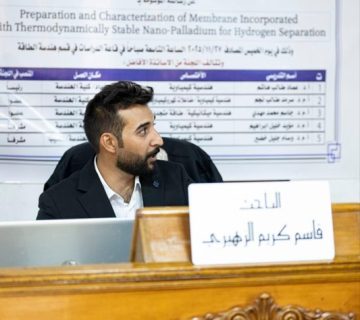Environmental Engineering Department at the College of Engineering, University of Baghdad, held PhD dissertation examination titled:
“Synthesis and characterization of Magnetic Activated Carbon (MAC) developed from palm date stones for the adsorption of Zinc, Cadmium, and lead from aqueous solution”
By the student Ali Ahmed Ali and supervised Assist.Prof.Dr. Haider Mohammed Abd-AlHameed on Wednesday 30/10/2024, in the Environmental Engineering discussion hall. The examination committee consisted of Prof.Dr. Ayad Abd-AlHamza Faisal as Chairman, and the membership of Prof.Dr. Shahla Ismail Ibrahim, Prof.Dr. Mohammed Sadeq Salman, Prof.Dr. Hussein Abd-AlMutalab Hamood, and Assist.Prof.Dr. Hussein Majeed Faleeh. After conducting the public discussion and listening to the student’s defense, the dissertation was accepted. It was summarized as follows:
Heavy metals such as cadmium, lead, and zinc are highly toxic and persistent, posing significant risks to human health and ecosystems. This study evaluates the performance of Magnetic Activated Carbon (MAC) for removing Pb²⁺, Zn²⁺, and Cd²⁺ ions from polluted water, comparing it with traditional Activated Carbon (AC) using various adsorption techniques. Activated carbon (AC) manufactured from palm date stone through physical activation and magnetic activated carbon (MAC) fabricated through co-precipitation of Fe3O4 were examined for their efficacy in removing lead (II), Zinc (II), and Cadmium (II) from aqueous solutions in batch, and continuous mode. AC, and MAC were characterized utilizing Surface Area, FTIR, XRD, SEM/ EDS, and VSM studies. In conclusion, MAC, with its enhanced physical properties and magnetic characteristics, provides a more effective and practical solution for removing Pb²⁺, Zn²⁺, and Cd²⁺ from contaminated water compared to traditional AC. Its superior performance in terms of adsorption capacity, efficiency, and handling complex metal ion systems underscores its potential as a robust and cost-effective option for environmental remediation and water treatment applications.
The recommendations of this dissertation:
1. Investigate the efficacy of utilizing manufactured magnetic activated carbon (MAC) to eliminate various heavy metal pollutants ions and organic contaminants from the liquid phase, including phenolic compounds, dyes, and furfural.
2. Investigate the process of adsorbing heavy metal ions onto MAC in a fluidized bed reactor.
3. Utilize activated carbon (AC) with other nanometal oxide particles.
4. Surface functionalization of various natural materials employing nano iron oxides to purify water contaminated with heavy ions.








